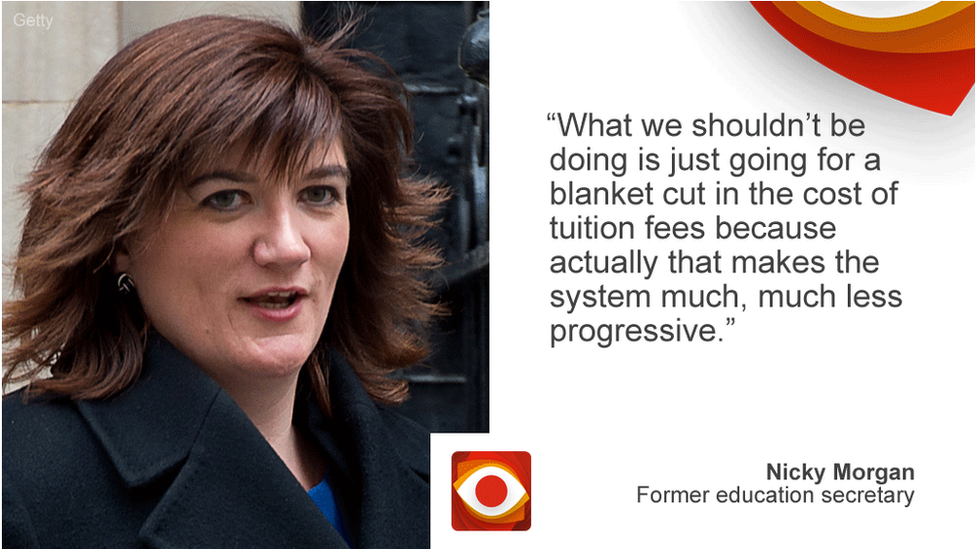Would cutting tuition fees help poorer graduates?
- Published

The claim: Cutting tuition fees for university students without changing anything else would make the system less progressive.
Reality Check verdict: If no other parts of the system were changed, a simple cut in tuition fees would not help those lower-income graduates who would not repay their loans within 30 years and would help higher-income graduates who would repay them.
Former Conservative education secretary Nicky Morgan said on BBC Radio 4 that a blanket cut in tuition fees would make the system less progressive.
A progressive system is one in which people pay more the richer they get. A system in which everybody pays the same regardless of their income or wealth would be described as regressive, because poorer people would pay a higher proportion of their income than richer ones.
Under the current system,, external graduates have to pay 9% of their taxable pay above a certain level (£21,000 a year at the moment, rising to £25,000 later this year) in loan repayments.
University tuition fees are a maximum of £9,250 a year in England; loans are also available to pay living costs and interest is charged on both.
You make the repayments for 30 years from the April after you finish or leave your course, at which point any remaining debt is written off.
So, if you go through that 30-year period without ever earning more than £25,000 in a year then you will never repay any of your loans and a cut in fees will make no difference to the amount you end up paying.
Psychological factors
The Institute for Fiscal Studies estimates, external that 83% of graduates will not have paid off their loans in full by the end of the 30 years.
Consider how a cut in fees would affect three groups of graduates - those who would never have paid off their loans within 30 years, those who would always have paid them off within 30 years and those who would only be able to pay within 30 years following a cut in fees.
There will be no change for the people in the first group, which contains the poorest graduates - they will still pay 9% of their income over £21,000 or £25,000 for 30 years.
The second group and third groups - the higher-earning graduates - would benefit because they get to stop paying sooner.
If the lowest-earning graduates are the only ones who do not benefit then you cannot call the change progressive.
Now, all this assumes that nothing else about the system changes - clearly there are systems that would be able to cut fees in a progressive way.
It's also important to bear in mind that there are psychological factors involved, so people might be unwilling to become £50,000 in debt even if the system means they are unlikely to have to pay it all off.
It should be said that applications to university, even among the poorest students, have continued rising despite rising tuition fees.
In Scotland, there are no fees for Scottish students. In Northern Ireland, fees are up to £4,030 a year. In Wales, fees are up to £9,000, but there are plans for higher levels of maintenance support.



- Published19 February 2018

- Published13 February 2018
- Published8 July 2017